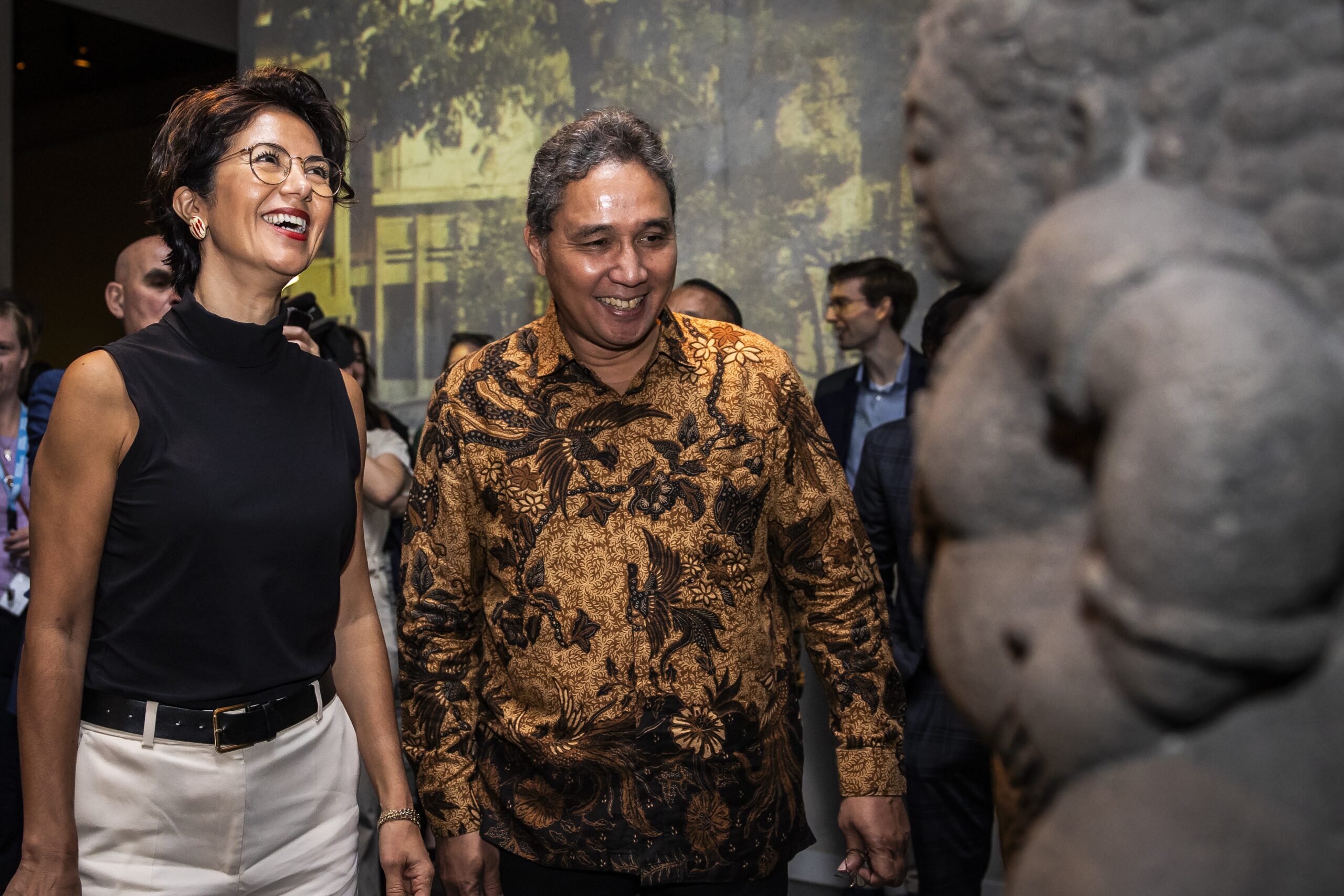Ceremonial handover of almost 500 colonial objects to Indonesia
Senay Boztas
Almost 500 objects of colonial looted art have been ceremonially handed back to Indonesia in an event at the National Museum of Ethnology in Leiden.
Caretaker culture minister Gunay Uslu symbolically signed over ownership of the objects, currently in possession of the National Museum of World Cultures, to Hilmar Farid, director general of the ministry of culture in Indonesia.
Last week the government announced that 478 objects, “wrongfully brought to the Netherlands during the colonial period, acquired under duress or by looting” would be returned to Indonesia as part of a new policy on colonial art with a dubious provenance. Another six objects in the Rijksmuseum will be given back to Sri Lanka.
Artworks that should not be in The Netherlands, a 2020 commission advised, should be returned if requested, to right a “historical injustice” if there was reasonable certainty there had been an involuntary loss of possession.
“Not far from Malang in East Java is the temple of Singosari,” said Uslu. “Visitors can be impressed by the huge statue of Shiva…but there also several empty [spots] that were once home to the giant statues of Bharaiva, Ganesa, and Durga.
“In 1804, the Dutch governor Nicolaus Engelhard transported these statues to his estate in the Netherlands, and gifted them to the Dutch king. Inside the empty [spots] in Singosari, you will see and smell incense, fresh flowers and rice in banana leaves. Small offerings, made daily. Although absent for more than 200 years, in a way, the statues of Singosari are still very much there.”
She said that it was a fitting part of the story of these statues, currently in the museum after a long journey across the sea, that they would be returned. “To support the giant statues, this museum’s floor had to be reinforced, as if the building itself expressed: this is not where the statues belong. It is the same way we feel now. We can no longer look at these works the same way, knowing how they came here.”
Java man
Following a request made by Indonesia, four Singosari statues, the Keris Puputan Klunkung, the Lombok treasure consisting of 335 objects and the Pita Maha collection of 132 pieces of modern art from Bali will be returned. A decision has not yet been made on the Dubois collection, including the “Java man” skull, one of the earliest specimens of the extinct early human, Homo erectus.
Representatives of Indonesia pledged to ensure the treasures are accessible to the public and part of exhibitions and research on their return. Farid said the research that had gone on prior to the decision also enriched historical knowledge in general.
“These objects have biographies, there are stories behind them,” he said. “It’s not a matter of just bringing back objects but also to reintegrate the missing part of the stories to the national historical narrative. We hope we will continue this endeavour and closer cooperation between two countries.”
Glass full
Lilian Gonçalves-Ho Kang You, chair of a committee on colonial collections, which recommended the return of important cultural artefacts that were probably not rightfully acquired, said this was the start of a “new relationship” and shared future. “The policy of restitution that is based on the fundamental principles of recognition of historical injustice to the local population of former colonial territories when objects were taken against their will,” she said. “A policy to rectify this historical injustice where possible… not motivated by legal but by ethical considerations relating to the colonial past.”
Gusti Agung Wesaka Puja, executive director of the ASEAN Institute for Peace and Reconciliation, said that both countries would benefit from the collaboration, process of research, and righting of past wrongs.
“We are not talking about a half-glass, half-empty glass or half-full glass,” he told a packed event. “We are glad that both of us finally agreed to find where the tap is, to fill the half-full and half-empty glass together.”
Thank you for donating to DutchNews.nl.
We could not provide the Dutch News service, and keep it free of charge, without the generous support of our readers. Your donations allow us to report on issues you tell us matter, and provide you with a summary of the most important Dutch news each day.
Make a donation